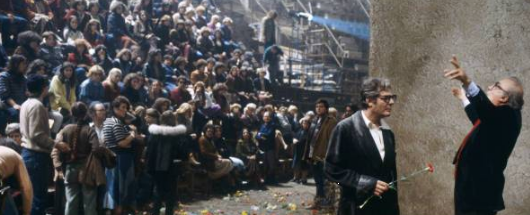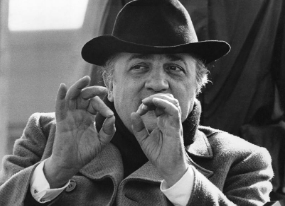|

"Get beyond passions like a great work of art" - Italian film director Federico Fellini
|
Italian film director Federico Fellini was one of the most celebrated and distinctive filmmakers of the period after World War II.Federico Fellini was born January 20, 1920, in Rimini, Italy.
He started to show signs of creativity early on, in high school while he served as a caricaturist for a local theatre, drawing portraits of movie stars. In 1939, Fellini moved to Rome, ostensibly to attend law school but in fact working for satirical magazine Marc’Aurelio. He began writing professionally around this time, working on radio shows. On one such show, he met actress Giulietta Masina, and the couple were married in 1943. They soon had a son, but he died just a month after birth. Giulietta Masina would later appear in several of her husband's most important films.
As a director, one of Fellini's major works is La dolce vita (1960), which starred Marcello Mastroianni, Anouk Aimée and Anita Ekberg. Fellini won best foreign-language Oscars for La strada (1954), Le notti di Cabiria (1957), 8 1/2 (1963) and Amarcord (1973). He also took home a Lifetime Achievement Oscar in 1993.
Italian neorealism, also known as the Golden Age, is a national film movement characterized by stories set amongst the poor and the working
|
|
class, filmed on location, frequently using non-professional actors. Neorealism films mostly contend with the difficult economic and moral conditions of post-World War II Italy, representing changes in the Italian psyche and conditions of everyday life, including poverty, oppression, injustice, and desperation.
The neorealist style was developed by a circle of film critics that revolved around the magazine Cinema, including Luchino Visconti, Gianni Puccini, Cesare Zavattini, Giuseppe De Santis and Pietro Ingrao.
Italian neorealism came about as World War II ended and Benito Mussolini's government fell, causing the Italian film industry to lose its centre. Neorealism was a sign of cultural change and social progress in Italy. Films presented contemporary stories and ideas and were often shot in streets.
As a counter to the popular main stream films, some critics felt that Italian cinema should turn tothe realist writers from the turn of the 20th century.
In the spring of 1945, Mussolini was executed and Italy was liberated from German occupation. This period, known as the "Italian
|
|
Spring," was a break from old ways and an entrance to a more realistic approach when making films. Italian cinema went from utilizing elaborate studio sets to shooting on location in the countryside and city streets in the realist style.
Fellini making a name for himself as a screenwriter and formed lasting relationships with the likes of director Roberto Rossellini and playwright Tullio Pinelli. Fellini signed on to join the writing team for Rossellini’s Roma, città aperta (1945), and the screenplay earned Fellini his first Oscar nomination. The partnership with Rossellini would be a fruitful one and would end up sending some of the most important films in Italian history to the screen, such as Paisà (1946), Il miracolo (1948) and Europa ’51 (1952).
Fellini’s quest for a more personal style, which often verged on the fantastic, alienated Neorealist purists.
Fellini’s screenwriting, which was in high demand in Italy, led to directing work, Fellini directed I vitelloni (1953), which won the Silver Lion award at the Venice Film Festival. He followed it with La strada (1954), which won the Academy Award for best foreign film. La strada,
|
|
|
now considered a classic, was the first in a trilogy of films in which Fellini explored how an unforgiving world greets innocence. The second two films in the trilogy were bidone (1955) and Le notti di Cabiria (1957), that latter landing Fellini his second Oscar.
What followed that trilogy were some of Fellini’s most well-known and often experimental films, such as La dolce vita (1960, which won the Palme d’Or at the Cannes Film Festival), 8½ (which took the 1963 Oscar for best foreign film), Fellini Satyricon (1969), Fellini Roma (1972) and Amarcord (1973, which took another Oscar). In all, Fellini won five Oscars and was nominated for several others. He was awarded his final Oscar, for career achievement, in 1993, just a few months before his death.
In 1992, in a Sight & Sound magazine poll of international filmmakers, Fellini was named the most significant film director of all time, and La strada and 8½ were named two of the Top 10 most influential films of all time. He also was awarded the Legion of Honor in 1984 and the Praemium Imperiale in 1990, which is granted by the Japan Art Association. The award is considered to be on the same footing as the Nobel Prize.
Fellini’s famous quotation – “We must get beyond passions like a great work of art. In such miraculous harmony. We should learn to love each other so much to live outside of time...”
On October 31, 1993, a day after his 50th wedding anniversary, Fellini died of a heart attack in Rome at the age of 73.

|
|
